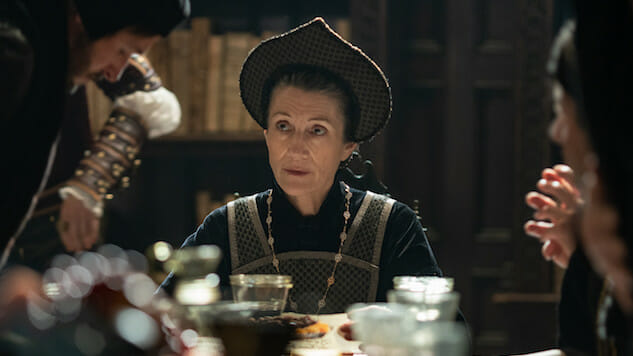An Ode to the Twisted Machinations of The Spanish Princess’ Margaret Beaufort
It's time to give Lady Margaret her due.
Photo Courtesy of Starz
“The king sleeps, until I say otherwise.” With those icy words, Her Lady the King’s Mother, Margaret Beaufort (Harriet Walter), put herself in control of the reality of her son’s mortality and essentially established herself as regent. Catherine (Charlotte Hope) had only just reminded Lady Margaret in the previous episode that Margaret’s claim to the throne was in fact stronger than either her son or grandson. But of course, given England’s laws at that time, a woman could not ascend to the throne.
That has not stopped Margaret Beaufort from doing absolutely everything she could to be a shadow ruler of England for decades. Arguably one of the most powerful (and forgotten)f figures in English History, Starz’s anthology on the War of the Roses has in many ways been its own ode to her behind-the-scenes reign. Though The White Queen, The White Princess, and The Spanish Princess have all focused on glamorous heroines and smoldering love stories of a variety of English queens, there Margaret has remained in the background from the beginning. Played first by Amanda Hale, then Michelle Fairley and finally Walter, Margaret Beaufort’s machinations have largely been the cause of the central struggles for all of the aforementioned women.
And yet, Lady Margaret was so much more powerful than some kind of catty in-law. She was groomed for an obsession with the throne, one that she passed on to her anxious and paranoid son Henry VII, which filtered through and manifested in a tortured confidence for her grandson Henry VIII. It is here, in The Spanish Princess’ last episode of Part 1, that we finally see Margaret defeated after fulfilling her destiny to see the Tudors relish in power. And as we know, it would become more of the most famous yet fraught periods in English history, as Henry VIII carried forth the “curse” of Elizabeth Woodville and the sins of his grandmother’s decades of machinations.
For those disappointed with the lack of political moves in Game of Thrones’ flimsy final episodes, The Spanish Princess provided an entire season that focused primarily on the importance of marriage alliances and taxation. This was not a situation where someone suggested a boy become king because he has a good story; there was a very careful buildup to the episode’s payoffs both of Harry and Catherine being free to marry, as well as the destruction of Margaret’s corrupt privy counsel, which restored lands back to the people and kicked off Harry’s reign with an abundance of good feeling.
And yet, in Game of Thrones fashion, the way was mostly paved with blood. The quick-shot executions engineered by Lady Margaret were one thing (something her grandson would also enact later in his own reign), but the series has also heavily stood on the side of historical hypothesis that Margaret was responsible for the murder of the Boys in the Tower (Lizzie’s brothers, in line for the throne). In the series she also murdered her brother-in-law Jasper (who she loved), and was willing to stop at nothing to hold fast to power and security for her family—namely, her son Henry.
-

-

-

-

- Curated Home Page Articles By Test Admin October 21, 2025 | 3:10pm
-

- Curated Home Page Articles By Test Admin October 21, 2025 | 2:57pm
- Urls By Test Admin October 21, 2025 | 2:57pm
- Curated Home Page Articles By Test Admin October 21, 2025 | 2:55pm
-

-

-

-

-

-

-

-

-

-

-

-

-

-

-

-

-

-

-

-

-

-

-

-

-

-

-

-

-

-

-





































